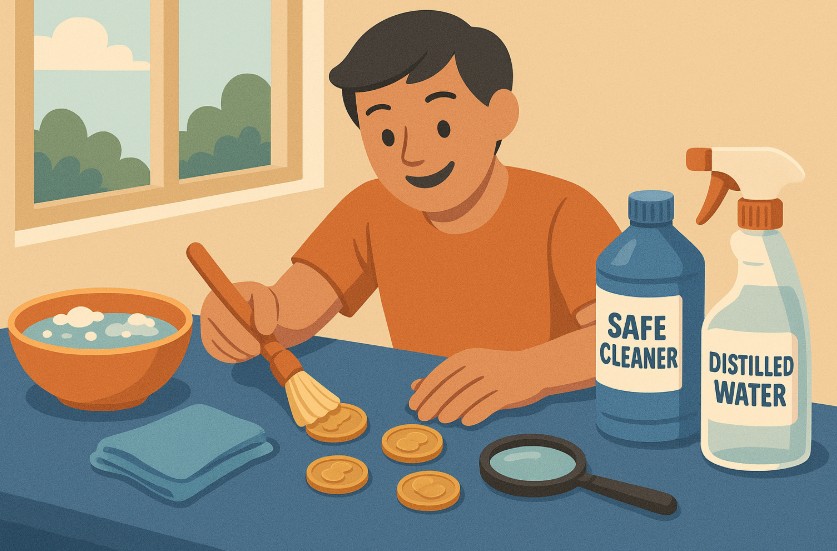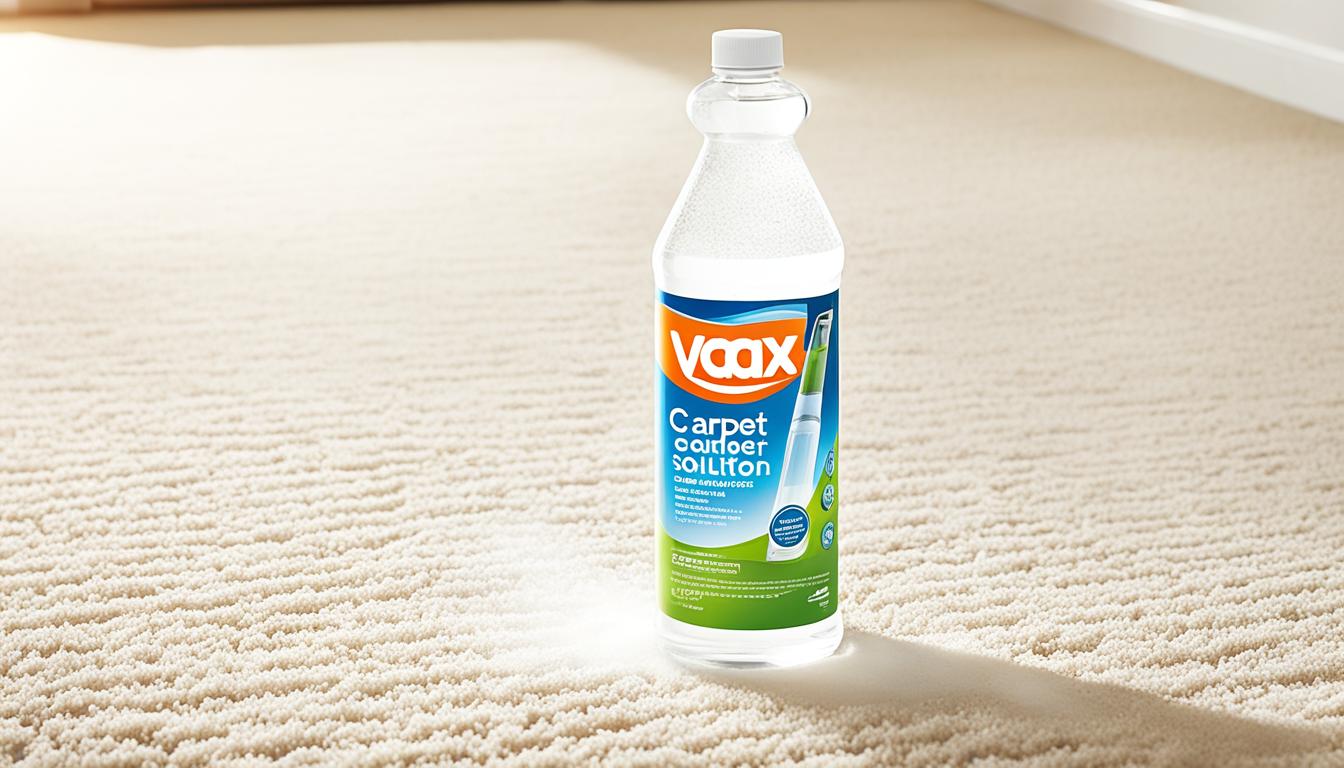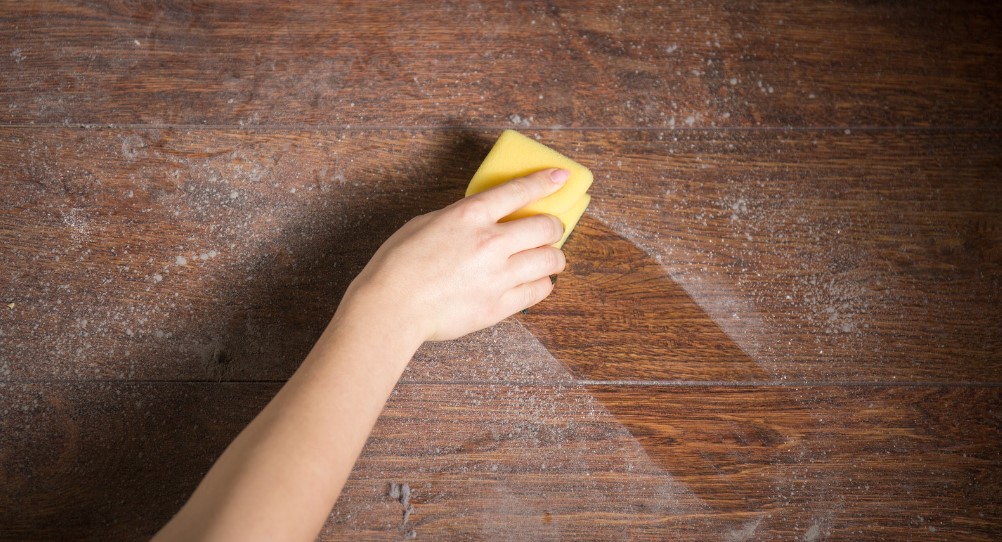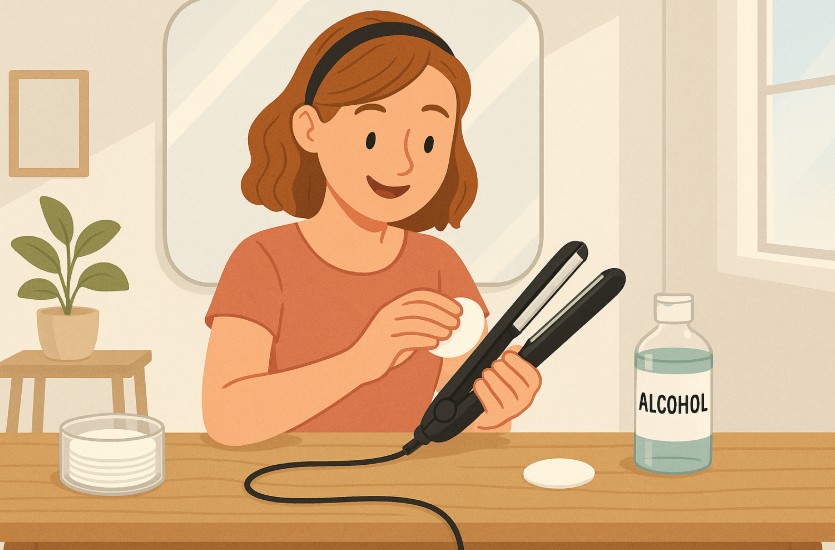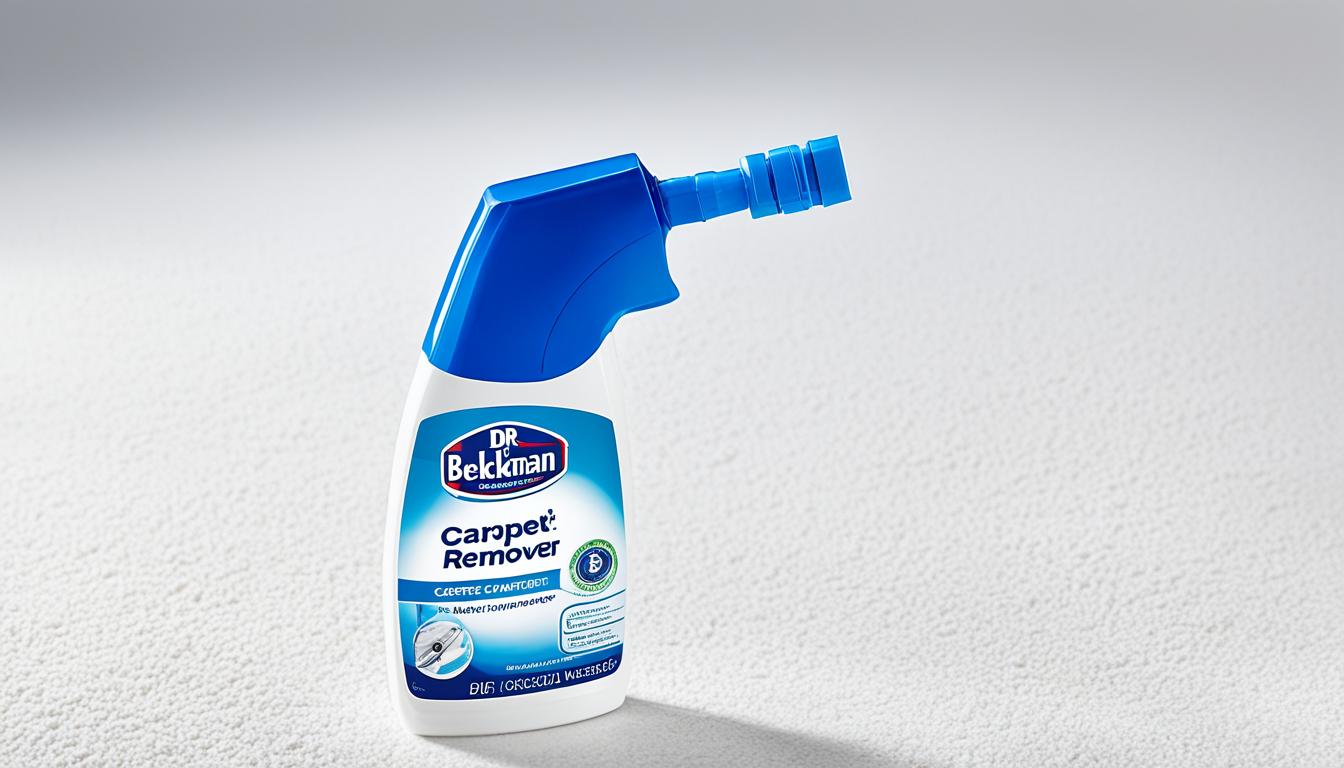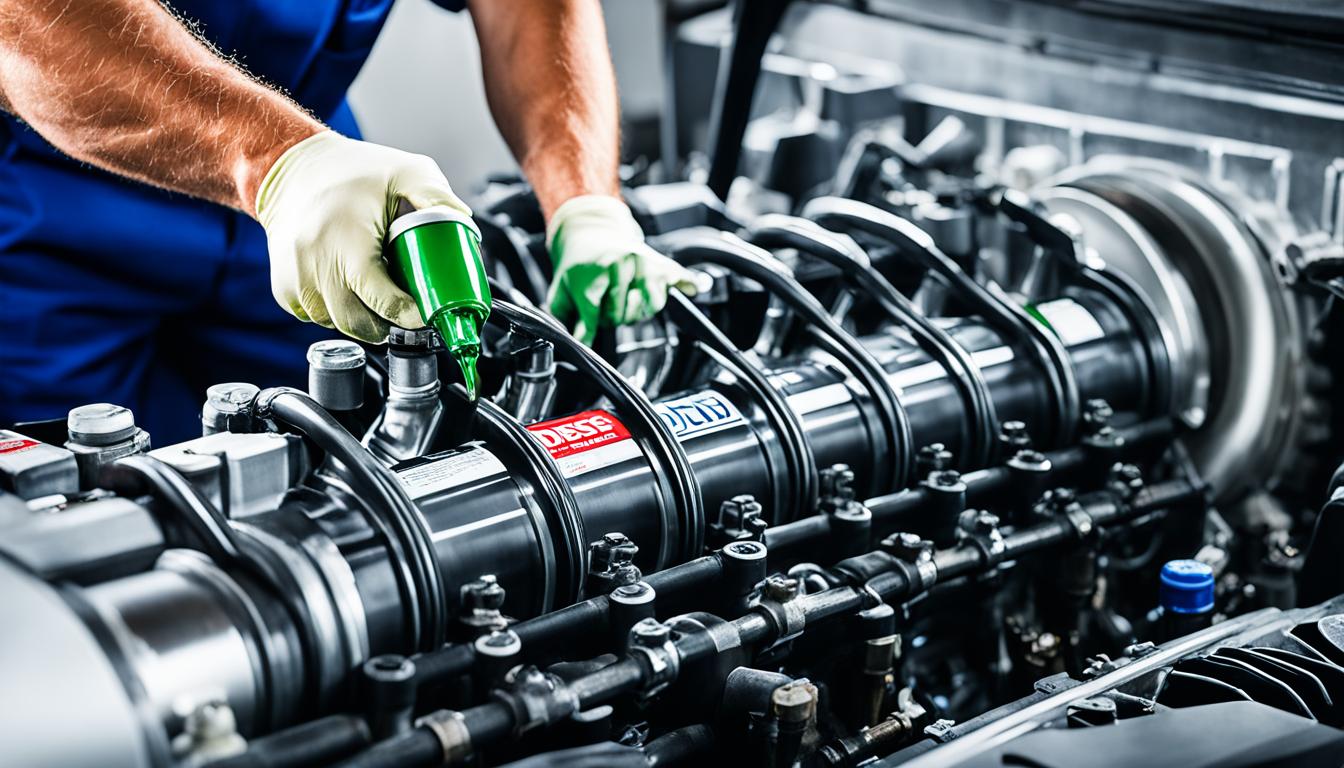Have you ever stumbled upon a dusty old coin and wondered if giving it a clean would increase its value? While your instinct might tell you to polish it until it shines, doing so could actually cause more harm than good.
Many old coins carry historical significance, and even the dirt or tarnish on them tells a story. Knowing how to clean old coins without damaging them iscrucial if you want to maintain their appearance while preserving their integrity and potential value.
Before reaching for soap and water, it’s important to understand that different metals react differently to cleaning. Some methods can be too abrasive, while others might strip away protective patinas.
This guide will walk you through safe, effective techniques for cleaning old coins at home, helping you avoid costly mistakes and make informed decisions that preserve your collection for the future.
Should You Clean Old Coins at All?

Before learning the methods for cleaning, it’s essential to consider whether the coin should be cleaned at all. Not every coin benefits from cleaning, and in many cases, it can actually reduce its value.
- Historical and collector value: Coins often gain worth not from how shiny they are, but from their originality. The patina or toning that forms naturally on older coins is appreciated by collectors.
- Surface wear tells a story: Each scratch or smudge adds authenticity. Removing this could strip away decades of visible history.
- Cleaning can cause irreversible damage: Abrasive tools and harsh chemicals can permanently alter the coin’s surface or remove intricate details.
Coins that are extremely rare or of high historical value should almost always be left untouched. A light rinse with distilled water is often the furthest you should go, and even then, only if it’s necessary.
If you’re unsure, it’s wise to consult a coin expert or numismatist. They can help assess the rarity, condition, and value before you clean. Attempting to clean a valuable coin without professional advice might lead to irreversible damage.
So always weigh up the benefits versus the risks carefully before making your decision. In short, cleaning should be reserved for coins of lower value or those for personal display, not for sale.
How to Prepare Coins Before Cleaning?
Cleaning coins isn’t something you should dive into unprepared. Taking a few minutes to set up properly can prevent damage and ensure safe handling of your collection.
Begin by identifying the coin. Look for the material type, silver, copper, gold, or other alloys, as this determines which cleaning method is appropriate. Once identified, check for signs of corrosion, patina, or damage that may affect the outcome.
Next, gather the essential tools and materials:
- Soft-bristled brush (like a baby toothbrush)
- Distilled water
- Lint-free or microfibre cloths
- Non-abrasive containers (ceramic or plastic)
- Cotton swabs
- Mild dish soap
- Olive oil
- Baking soda
- Lemon juice and salt
When handling the coins, always hold them by the edges. Oils and moisture from your fingers can damage the surface, particularly if the coin is already worn or oxidised. Avoid placing coins on hard surfaces; instead, lay them on a clean cloth to avoid scratches.
Do a spot-check or test on modern loose change before applying any method to older coins. This helps you get comfortable with the process and reduces the risk of error.
Finally, set up in a well-lit area where you can easily see what you’re doing. Clean one coin at a time and never mix different metals during the cleaning process.
Safe Ways to Clean Old Coins Without Damage?
If your coin is suitable for cleaning, the key is to use gentle, proven methods that won’t damage the surface. Here are six safe techniques you can try at home.
Step 1: Start With a Distilled Water Rinse
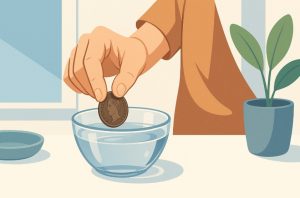
Distilled water is your safest starting point for cleaning any coin, regardless of its material. It helps loosen dirt and contaminants without exposing the coin to chemicals found in tap water.
Place the coin in a shallow dish filled with distilled water and let it soak for a few hours. Swirl it gently to encourage dirt removal. Avoid any rubbing or scrubbing at this stage. Once done, pat dry using a soft, lint-free cloth.
Step 2: Mild Soap and Water Method
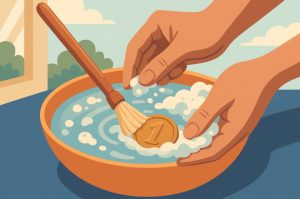
Create a solution by adding a drop of mild liquid soap to a bowl of distilled water. Submerge the coin and gently move it around to help dislodge debris. If needed, use a soft-bristled brush while the coin remains underwater.
Rinse thoroughly with distilled water afterward and air dry on a clean cloth. Never use scented or coloured soaps, as these may contain chemicals harmful to coin surfaces.
Step 3: Olive Oil Soak for Deep Dirt
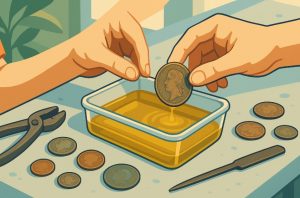
For heavily encrusted coins, especially copper or bronze ones, olive oil is a slow but effective option. Submerge the coin in olive oil for several days or weeks.
This process helps to loosen tough grime without harsh effects. Once soaked, remove it and use a soft cloth or cotton swab to gently wipe off the loosened dirt. Rinse thoroughly with distilled water before drying.
Step 4: Baking Soda Paste (for common coins)
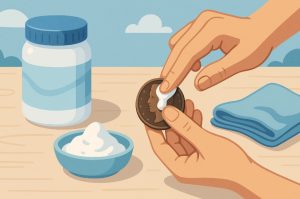
Baking soda can lift surface dirt, but it should only be used on common or modern coins. Mix a small amount of baking soda with distilled water to form a soft paste. Using your fingers or a soft cloth, gently rub the paste onto the coin’s surface. Avoid using this on coins with any significant historical or collector value.
Step 5: Lemon Juice & Salt for Surface Grime
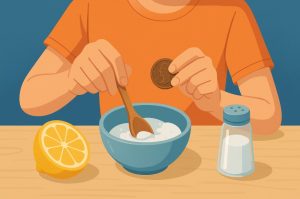
Combine lemon juice and table salt to create a gentle acidic paste. Apply this paste with a cotton swab and gently rub the surface. This method works well for copper or bronze coins, but should be used sparingly. Overuse can strip natural patina.
Step 6: Vinegar and Salt Soak (Use with caution)
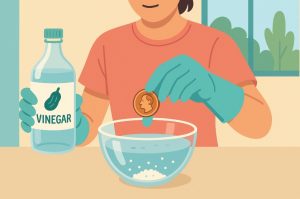
For copper coins with stubborn oxidation, you can use a white vinegar and salt solution. Soak the coin for 5–10 minutes, then rinse immediately and dry thoroughly. Never leave coins in acidic solutions too long, as they can corrode metal and erase detail.
How to Clean Silver, Copper, and Gold Coins?
Different metals respond differently to cleaning methods. It’s crucial to use techniques tailored to the coin’s composition to avoid irreversible damage.
Cleaning Silver Coins
Silver coins often develop a dark tarnish caused by exposure to air and moisture. To clean silver coins gently, prepare a paste of baking soda and distilled water. Using a soft cloth, lightly apply the paste and rub in a circular motion.
Avoid using silver polish or abrasive cleaners, as they can strip away the coin’s natural toning, which collectors find valuable. Rinse with distilled water and pat dry with a soft towel. For delicate silver pieces, this method offers a perfect balance between cleanliness and preservation.
Cleaning Copper Coins
Copper coins often develop a green patina that protects the metal beneath. If the coin is encrusted with dirt, an olive oil soak is the safest first step. Soak the coin for several days, allowing the oil to soften any grime. Afterward, use a cotton swab to remove dirt.
Avoid vinegar or lemon-based solutions on valuable copper coins, as their acidity can strip the patina and damage the surface. While these solutions are effective, they’re best used on less valuable or heavily tarnished coins.
Cleaning Gold Coins
Gold coins rarely tarnish, and most do not require cleaning. However, if cleaning is needed, the safest method is using a soft cloth lightly dampened with distilled water. Gently wipe the coin without applying pressure.
Never use chemical solutions on gold coins, as they may damage the finish. Always test a small area first and avoid polishing, which can devalue the coin. In general, gold coins should be left as-is unless they’re extremely dirty, and even then, minimal cleaning is recommended.
Whether you’re working with silver, copper, or gold, always start with the mildest method and proceed cautiously. Your goal should be preservation, not perfection.
What to Avoid When Cleaning Old Coins?
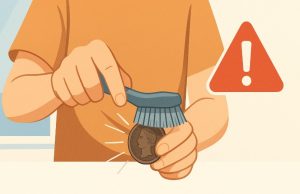
While cleaning old coins, several common mistakes can cause irreparable damage. Knowing what to avoid is just as important as knowing what to do.
- Tap water: Contains minerals and chemicals that can leave residue or react with the coin’s metal.
- Harsh chemicals: Acidic solutions like vinegar or ketchup can corrode metal if overused. They should only be used on non-valuable coins and rinsed off quickly.
- Abrasive tools: Avoid stiff brushes, scouring pads, or toothbrushes with hard bristles, as they can scratch the coin’s surface.
- Excessive scrubbing: Even soft scrubbing can wear down raised details, especially on older coins.
- Heat drying: Using hairdryers or direct sunlight to dry coins can cause warping or discolouration.
- Mixing cleaning methods: Don’t switch between acidic and alkaline solutions without thoroughly rinsing in between. This can cause chemical reactions on the coin’s surface.
It’s always better to under-clean than to overdo it. If you’re ever unsure, pause the cleaning process and reassess. A coin’s character lies in its story, and sometimes that story includes a bit of grime. Preserve wisely, clean gently, and when in doubt, consult an expert.
Storing and Preserving Clean Coins
Cleaning your coins is just the first step. To maintain their condition and prevent future tarnishing or corrosion, proper storage and handling are essential.
Start by storing each coin separately to avoid scratching. Use coin capsules, 2×2 holders, or acid-free coin flips. These provide a protective barrier while allowing visibility and airflow.
- Avoid PVC holders: Some plastic sleeves contain PVC, which can release chemicals over time that damage coin surfaces.
- Use silica gel: In storage containers, place silica gel packets to absorb excess moisture and protect coins from humidity.
- Choose a dry and stable environment: Temperature fluctuations and high humidity can accelerate oxidation. Store coins in a cool, dry room away from direct sunlight.
- Wear cotton gloves when handling: The natural oils on your fingers can lead to discolouration or tarnish. If gloves aren’t available, hold coins only by the edges.
- Avoid stacking: Even with protective sleeves, stacking coins can result in pressure damage over time.
If you plan to keep coins long-term, consider placing them in a purpose-built coin album or storage case. This offers additional support and reduces exposure to environmental contaminants.
By taking these steps, you help ensure your coins remain in excellent condition for years to come, whether you’re preserving them for display or investment.
Conclusion
Cleaning old coins without damaging them takes patience, the right tools, and a deep understanding of the coin’s value and material. It’s not just about restoring shine but also about protecting historical and monetary worth.
While household methods like distilled water, olive oil, and baking soda offer effective results for common coins, caution is always essential, especially with rare or antique pieces.
In many cases, doing nothing is better than risking damage. If in doubt, consulting a professional is always the safest route. Once cleaned, proper storage is just as vital as the cleaning process itself.
By following safe, proven techniques and avoiding harsh chemicals or abrasive tools, you’ll be able to enhance the appearance of your coins without stripping away their story. Clean wisely, store responsibly, and your collection will remain a valued piece of history for generations.
FAQs
What’s the safest way to clean coins at home?
Using distilled water with light brushing from a soft-bristled brush is the safest and most non-invasive method.
Can cleaning reduce the value of old coins?
Yes, improper cleaning can scratch the surface and remove patina, significantly decreasing a coin’s value.
How do you clean coins without scratching them?
Always soak coins in distilled water or olive oil first and avoid using any rough tools or scrubbing motions.
Is vinegar safe for cleaning antique coins?
Vinegar is too acidic for valuable coins and should only be used cautiously on modern or low-value pieces.
Can you use baking soda to clean silver coins?
Yes, but only as a soft paste and with minimal pressure to avoid scratching or removing natural toning.
What’s the best way to store coins after cleaning?
Use individual acid-free holders in a dry, cool environment with silica gel to control humidity.
How can I tell if my coin is valuable before cleaning it?
Check online guides, consult a coin expert, and compare your coin’s condition and rarity to similar ones.

